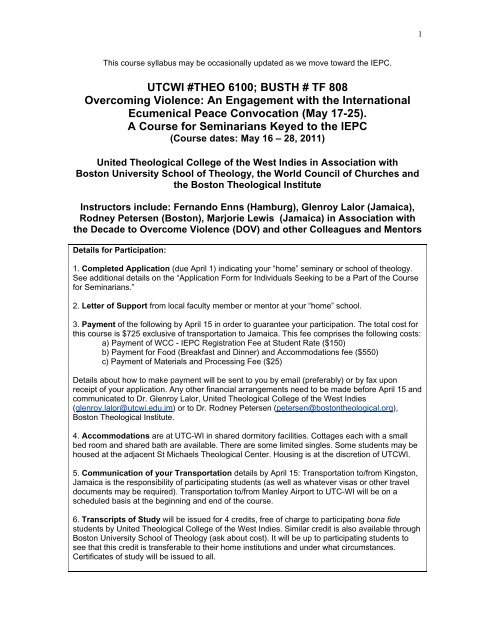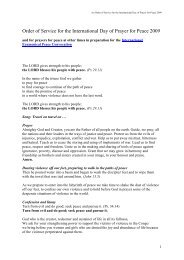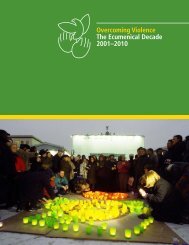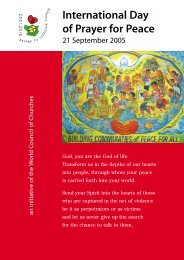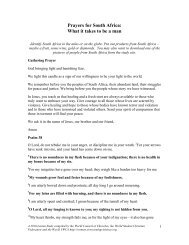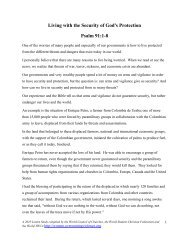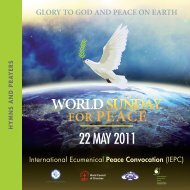Syllabus (pdf, 100 KB) - International Ecumenical Peace Convocation
Syllabus (pdf, 100 KB) - International Ecumenical Peace Convocation
Syllabus (pdf, 100 KB) - International Ecumenical Peace Convocation
You also want an ePaper? Increase the reach of your titles
YUMPU automatically turns print PDFs into web optimized ePapers that Google loves.
1<br />
This course syllabus may be occasionally updated as we move toward the IEPC.<br />
UTCWI #THEO 6<strong>100</strong>; BUSTH # TF 808<br />
Overcoming Violence: An Engagement with the <strong>International</strong><br />
<strong>Ecumenical</strong> <strong>Peace</strong> <strong>Convocation</strong> (May 17-25).<br />
A Course for Seminarians Keyed to the IEPC<br />
(Course dates: May 16 – 28, 2011)<br />
United Theological College of the West Indies in Association with<br />
Boston University School of Theology, the World Council of Churches and<br />
the Boston Theological Institute<br />
Instructors include: Fernando Enns (Hamburg), Glenroy Lalor (Jamaica),<br />
Rodney Petersen (Boston), Marjorie Lewis (Jamaica) in Association with<br />
the Decade to Overcome Violence (DOV) and other Colleagues and Mentors<br />
Details for Participation:<br />
1. Completed Application (due April 1) indicating your “home” seminary or school of theology.<br />
See additional details on the “Application Form for Individuals Seeking to be a Part of the Course<br />
for Seminarians.”<br />
2. Letter of Support from local faculty member or mentor at your “home” school.<br />
3. Payment of the following by April 15 in order to guarantee your participation. The total cost for<br />
this course is $725 exclusive of transportation to Jamaica. This fee comprises the following costs:<br />
a) Payment of WCC - IEPC Registration Fee at Student Rate ($150)<br />
b) Payment for Food (Breakfast and Dinner) and Accommodations fee ($550)<br />
c) Payment of Materials and Processing Fee ($25)<br />
Details about how to make payment will be sent to you by email (preferably) or by fax upon<br />
receipt of your application. Any other financial arrangements need to be made before April 15 and<br />
communicated to Dr. Glenroy Lalor, United Theological College of the West Indies<br />
(glenroy.lalor@utcwi.edu.jm) or to Dr. Rodney Petersen (petersen@bostontheological.org),<br />
Boston Theological Institute.<br />
4. Accommodations are at UTC-WI in shared dormitory facilities. Cottages each with a small<br />
bed room and shared bath are available. There are some limited singles. Some students may be<br />
housed at the adjacent St Michaels Theological Center. Housing is at the discretion of UTCWI.<br />
5. Communication of your Transportation details by April 15: Transportation to/from Kingston,<br />
Jamaica is the responsibility of participating students (as well as whatever visas or other travel<br />
documents may be required). Transportation to/from Manley Airport to UTC-WI will be on a<br />
scheduled basis at the beginning and end of the course.<br />
6. Transcripts of Study will be issued for 4 credits, free of charge to participating bona fide<br />
students by United Theological College of the West Indies. Similar credit is also available through<br />
Boston University School of Theology (ask about cost). It will be up to participating students to<br />
see that this credit is transferable to their home institutions and under what circumstances.<br />
Certificates of study will be issued to all.
2<br />
7. Ask about possible scholarship assistance. This is limited and we encourage you to work<br />
through your local school, denomination/Church or Council of Churches. Address questions to Dr.<br />
Glenroy Lalor or Dr. Rodney Petersen (addresses given above).<br />
I. Course Objectives<br />
The <strong>International</strong> <strong>Ecumenical</strong> <strong>Peace</strong> <strong>Convocation</strong> (IEPC) is a "harvest festival"<br />
celebrating the achievements of the Decade to Overcome Violence (DOV) which<br />
began in 2001, calling attention to the ways communities of faith are implicated in<br />
violence as well as to the unique resources with which they are equipped for<br />
overcoming violence. It provides a unique opportunity for ecumenical formation<br />
even as it encourages individuals and churches to renew their commitment to<br />
nonviolence, peace and justice. The objectives of this course are these: 1) to<br />
survey areas of violence which confront the churches as provided by the IEPC,<br />
2) to begin to become skilled as peace-makers with respect to IEPC themes, and<br />
3) to foster learning in the context of ecumenical formation.<br />
II. Course Procedure<br />
This course consists in the first place in taking part in the program elements of<br />
the <strong>International</strong> <strong>Ecumenical</strong> <strong>Peace</strong> <strong>Convocation</strong>, capstone event of the Decade<br />
to Overcome Violence (DOV), a program initiative of the World Council of<br />
Churches. Program elements include: 1) Bible Studies, 2) Plenaries, 3)<br />
Seminars, and 4) Workshops.<br />
Additionally, the course is structured so as to provide an integrated approach to<br />
the different elements of the IEPC and the DOV process out of which it has<br />
come, i.e., to the IEPC themes, DOV resources such as expert consultations, the<br />
Declaration on Just <strong>Peace</strong> and to the Living Letters.<br />
As we begin to see what attendance in the course will be like, there is every<br />
expectation that we will divide the group on occasion so as to meet with mentors<br />
from different global regions where possible.<br />
III. Requirements and Grading<br />
Grading<br />
• Participation in Conference and Daily Reflections is expected (30%)<br />
• Two “Secondary” Papers, 5 pp. each (15% each or 30%)<br />
1) Critical Summary of a DOV Expert Panel<br />
2) Critical Summary of a DOV Living Letter<br />
• Final Paper/Project, 15-20 pp. (40%)<br />
Paper or Project oriented to one of the 4 thematic trajectories of the IEPC<br />
with reference to its critical application in one’s home country.<br />
• All written work is due no later than December 1, 2011 with tuition<br />
information communicated to home institutions by mid January 2012.
3<br />
The purpose of projecting written work, particularly the final paper or project to<br />
the date suggested is for practical reasons given the intensity of the IEPC event<br />
and the difficulty of working with resources while in Jamaica. The percentage of<br />
the grade dedicated to the final paper/project is to take the learning of the<br />
conference and apply it in a weighted fashion to a paper or project in given areas<br />
around the world with a desire to focus on the participant’s region.<br />
The language of instruction is English and it is expected that all written work will<br />
be in English.<br />
IV. Course Schedule<br />
Monday, 16 May Arrival (Some may need to arrive on 5/15)<br />
(Dinner for those arriving on 5/15)<br />
Monday, 16 May Orientation to UTCWI and Youth Pre-Event<br />
Breakfast<br />
UTC-WI<br />
Lunch<br />
Youth Pre-event (scheduled for the 16th and 17 th ) at a location in<br />
Kingston, the focus: preparing for the IEPC via the 4 themes (with Youth<br />
Desk Secretary)<br />
Dinner & Free Time<br />
Tuesday, 17 May Orientation – Integrate with Youth Pre-Event<br />
(IEPC Arrivals)<br />
Breakfast<br />
Orientation to the Just<strong>Peace</strong> Declaration (track through <strong>Convocation</strong>)<br />
Lunch<br />
Orientation to Local Situations<br />
Dinner & Free Time: possible meeting with Rasta Group<br />
Wednesday, 18 May Plenary: DOV Celebration & Highlights from<br />
Streams<br />
Breakfast<br />
Orientations & Exposures to Local Situations and Initiatives<br />
Lunch<br />
Opening Plenary<br />
Break<br />
Seminarians Reflection Group at UTC – #1<br />
Opening Prayer<br />
Dinner with Local Guests<br />
Thursday, 19 May Plenary: <strong>Peace</strong> in the Community
4<br />
Breakfast<br />
Prayer & Bible Study<br />
Plenary<br />
Lunch & Free Time<br />
Sharing and Learning<br />
Seminarians’ Reflection Group at UTC – #2<br />
Evening Prayer<br />
Dinner<br />
Special Events<br />
Friday, 20 May Plenary: <strong>Peace</strong> with the Earth<br />
Breakfast<br />
Prayer & Bible Study<br />
Plenary<br />
Lunch & Free Time<br />
Sharing and Learning<br />
Seminarians’ Reflection Group at UTC – #3<br />
Evening Prayer<br />
Dinner<br />
Special Events<br />
Saturday, 21 May Plenary: <strong>Peace</strong> in the Marketplace<br />
Breakfast<br />
Prayer & Bible Study<br />
Plenary<br />
Lunch & Free Time<br />
Sharing and Learning<br />
Seminarians’ Reflection Group at UTC – #4<br />
Evening Prayer<br />
Dinner<br />
Special Events<br />
Sunday, 22 May<br />
Caribbean Day<br />
Monday, 23 May Plenary: <strong>Peace</strong> Among the Peoples<br />
Breakfast<br />
Prayer & Bible Study<br />
Plenary<br />
Lunch & Free Time<br />
Sharing and Learning<br />
Seminarians’ Reflection Group at UTC – #5<br />
Evening Prayer<br />
Dinner<br />
Special Events<br />
Tuesday, 24 May<br />
Weaving Ceremony and Closing Plenary
5<br />
Breakfast<br />
Prayer & Bible Study<br />
Reports from Sharing and Learning<br />
Weaving Ceremony<br />
Lunch & Free Time<br />
Closing Plenary<br />
Sending Prayer<br />
Dinner<br />
Seminarians’ Reflection Group at UTC – #6<br />
Wednesday, 25 May<br />
Breakfast<br />
Prayer & Bible Study<br />
Summaries from Expert Consultations<br />
Seminarians’ Reflection Group at UTC – #7<br />
Lunch<br />
Summaries from Expert Consultations<br />
Seminarians’ Reflection Group at UTC – #8<br />
Dinner & Free Time Excursion<br />
Thursday, 26 May<br />
Breakfast<br />
Prayer & Bible Study<br />
Regional Summaries and Proposals (Drawing from Living Letters)<br />
Seminarians’ Reflection Group at UTC – #9<br />
Lunch<br />
Regional Summaries and Proposals (Drawing from Living Letters)<br />
Seminarians’ Reflection Group at UTC – #10<br />
Celebratory Dinner & Envisioning an Order of <strong>Peace</strong>makers<br />
Friday, 27 May<br />
Possible trip to Montego Bay and Mobay Baptist Church (Deacon<br />
Sharpe’s Rebellion)<br />
Saturday, 28 May<br />
Breakfast<br />
Departure
6<br />
V. Required Readings (available on the web)<br />
A. General Reading Related to the Decade to Overcome Violence<br />
1. Diana Mavunduse and Simon Oxley, Why Violence? Why Not <strong>Peace</strong>?<br />
(WCC, 2003). A study guide to help individuals and groups in the<br />
churches to reflect and act in the Decade to Overcome Violence oriented<br />
around: 1) the spirit and logic of violence, 2) the use, abuse and misuse of<br />
power, 3) the issues of justice, and 4) religious identity and plurality.<br />
http://www2.wcccoe.org/dov.nsf/51bb65526e8149bac1256c1c003547c6/42084945a42e42<br />
3bc1256c450040a1f3?OpenDocument<br />
2. Geiko Müller-Fahrenholz, “<strong>International</strong> <strong>Ecumenical</strong> <strong>Peace</strong> <strong>Convocation</strong> –<br />
Its Relevance for Theological Education in the 21st. Century,” BTI<br />
Magazine, vol. 10, no. 2 (Spring 2011): www.bostontheological.org<br />
3. Simon Oxley, Telling the Truth about Ourselves and Our World (WCC,<br />
2009) A study guide to help individuals and churches continue to reflect<br />
and act together as the 2001-2010 Decade to Overcome Violence –<br />
Churches Seeking Reconciliation and <strong>Peace</strong> is celebrated at the (May 17-<br />
25, 2011, Kingston, Jamaica).<br />
http://www.overcomingviolence.org/fileadmin/dov/files/iepc/resources/Telli<br />
ngTheTruth_v<strong>100</strong>115.<strong>pdf</strong><br />
4. Rodney Petersen and Marian Simion, eds., Overcoming Violence:<br />
Religion, Conflict and <strong>Peace</strong>-building (Newton: Boston Theological<br />
Institute, 2010): www.bostontheological.org<br />
B. Specific DOV documents that will be used in our deliberations in Jamaica:<br />
1. An <strong>Ecumenical</strong> Call to Just <strong>Peace</strong>, World Council of Churches, 2011<br />
on-line at www.oikumene.org from 3/11.<br />
2. Just <strong>Peace</strong> Companion, WCC 2011.<br />
on-line at www.oikumene.org from 3/11.<br />
3. <strong>Ecumenical</strong> Review, 4/11 - whole issue is on Just <strong>Peace</strong><br />
4. Living Letters Report: http://www.overcomingviolence.org/en/peaceconvocation/preparatory-process/living-letters-visits.html<br />
5. Expert Consultations: http://www.overcomingviolence.org/en/peaceconvocation/expert-consultations/past-events.html
7<br />
6. Decade to Overcome Violence - Final Report, from 3/11<br />
C. Additional Titles in process in relation to the four IEPC trajectories.<br />
VI. Additional Bibliography<br />
1. Glen H. Stassen, Just <strong>Peace</strong>making: The New Paradigm for the Ethics of<br />
<strong>Peace</strong> and War (Pilgrim Press, 2008).<br />
2. Glen H. Stassen and Rodney Petersen, eds., Formation for Just<br />
<strong>Peace</strong>making (Wipf and Stock, 2011).<br />
VII. Additional Mentors Include:<br />
• Fr. Emmanuel Clapsis, Holy Cross Greek Orthodox School of<br />
Theology, Boston<br />
• Marsha Snulligan-Haney, Interdenominational Theological Center,<br />
Atlanta<br />
• Fr. Raymond Helmick, SJ, Boston College, Boston<br />
• Thomas Porter, JD, Boston University School of Theology, Boston<br />
Additional Names to be added….


